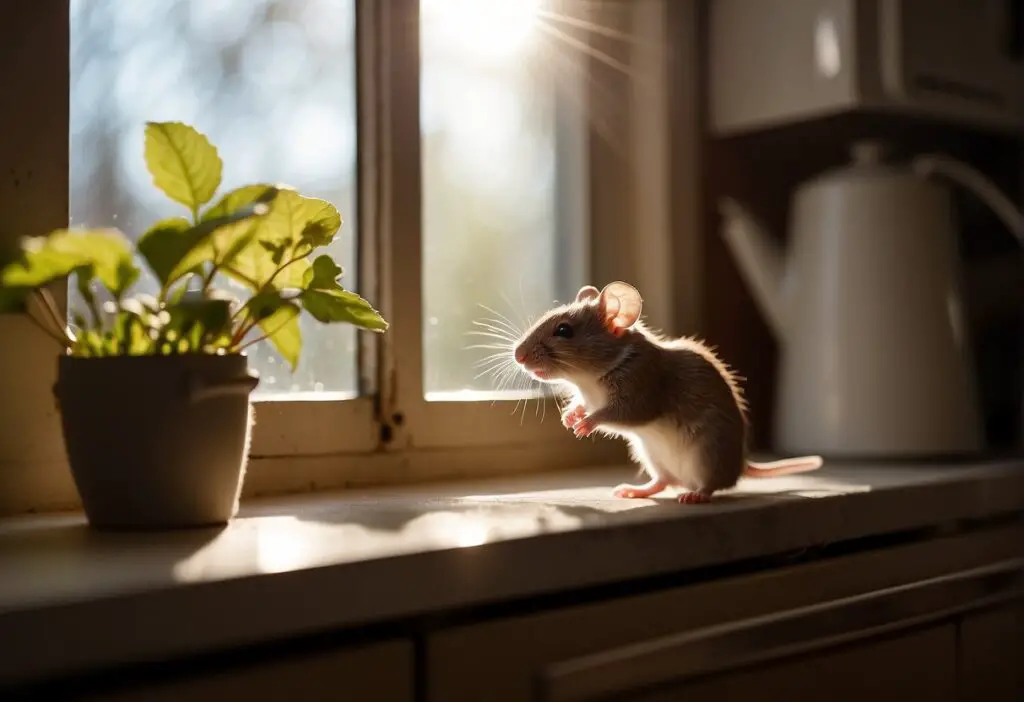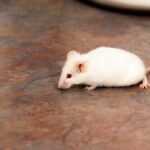Are you wondering why mice seem to invade your home during the summer months?
It’s not uncommon to see these pesky rodents scurrying around your house, but what is it about the summer that attracts them? There are a few reasons why mice tend to come inside during this time of year.

One of the main reasons is the heat. Just like humans, mice don’t like being outside in the scorching sun all day. They prefer to stay in cooler, shaded areas, which is why your home may be a perfect spot for them. Additionally, during the summer months, there is an abundance of food available for mice. Gardens are in full bloom, and many households have outdoor barbecues and picnics, which means there are plenty of crumbs and scraps for mice to feast on.
Another reason why mice come inside during the summer is to escape predators. With the warm weather, many predators such as snakes, birds of prey, and cats are more active, making it more dangerous for mice to be outside. By coming inside, mice can avoid these predators and feel safer. While it’s understandable why mice would want to come inside during the summer, it’s important to take steps to prevent them from making themselves at home in your house.
Understanding Mice Behavior in Summer
As the weather heats up, you may start to notice an increase in mouse activity in your home. Understanding why mice come into the house in the summer can help you take steps to prevent infestations. Here are a few things to keep in mind:
Seasonal Changes and Mice Activity
Mice are more active in the summer because the warm weather allows them to move around more easily. They also tend to breed more frequently during this time, which can lead to an increase in the mouse population. As a result, you may notice more mice in and around your home during the summer months.
The Search for Ideal Nesting Places
During the summer, mice will search for ideal nesting places that provide shelter from the heat. This means they may be attracted to areas of your home that are cool and dark, such as basements, attics, and crawl spaces. Mice will also look for areas that provide easy access to food and water, such as kitchens and bathrooms.
To prevent mice from entering your home in the summer, it’s important to seal up any cracks or gaps in your home’s exterior. This will make it more difficult for mice to enter your home and find suitable nesting places. You should also make sure to keep your home clean and free of food debris, as this will help to discourage mice from entering your home in search of food.
By understanding why mice come into the house in the summer and taking steps to prevent infestations, you can keep your home free of these unwanted pests.
Why Mice Enter Houses During Summer
If you’ve noticed a sudden increase in mouse activity in your house during the summer, you’re not alone. Mice are known to enter houses during summer, and there are several reasons why they do so. In this section, we’ll explore some of the reasons why mice enter houses during summer.
Escaping the Heat
One of the primary reasons why mice enter houses during summer is to escape the heat. According to Bug Master Pest Control, the heat drives rats and mice indoors. Mice prefer living inside versus outdoors primarily because of shelter from wind and rain. Your house provides an ideal environment for mice to escape the summer heat.
Availability of Food and Water
Mice are voracious eaters and need a stable food and water supply to survive. During summer, the chances of getting water decrease when it’s considerably hot. As a result, mice will readily invade your house to access food and water. According to Rodent Guide, the availability of food and water is a significant factor in why mice enter houses during summer.
Protection from Predators
Mice are prey animals, and they are constantly on the lookout for predators. Your house provides an excellent shelter from predators such as birds, snakes, and cats. According to House Related, mice will enter your house during summer to find shelter and escape from the outside world.
In summary, mice enter houses during summer to escape the heat, find food and water, and seek protection from predators. If you’re experiencing a mouse infestation in your house during summer, it’s essential to take measures to prevent them from entering your house. Keep your house clean, seal all entry points, and remove any potential food and water sources.
Common Entry Points for Mice
During the summer months, mice are always looking for a cool and comfortable place to stay. Unfortunately, this often means they will try to find their way into your home. Knowing where mice are likely to enter your home can help you take steps to prevent them from getting in. Here are some of the most common entry points for mice:
Gaps and Cracks
Mice can squeeze through gaps and cracks as small as a quarter of an inch. They can enter your home through gaps around pipes, cables, and vents. They can also enter through cracks in your foundation or walls. To prevent mice from entering your home through gaps and cracks, seal any openings with caulk or foam.
Doors and Windows
Mice can enter your home through doors and windows that are not properly sealed. They can squeeze through gaps around the edges of doors and windows. They can also enter through doors and windows that are left open. To prevent mice from entering your home through doors and windows, make sure all doors and windows are properly sealed. Install weatherstripping around doors and windows to prevent gaps.
Vents and Eaves
Mice can enter your home through vents and eaves. They can squeeze through the small openings in your attic vents or crawl space vents. They can also enter through gaps in your eaves. To prevent mice from entering your home through vents and eaves, install screens over all vents and seal any gaps in your eaves.
By knowing where mice are likely to enter your home, you can take steps to prevent them from getting in. Sealing gaps and cracks, properly sealing doors and windows, and installing screens over vents are all effective ways to prevent mice from entering your home.
Preventing Mice Infestations in Summer
Mice infestations in summer can be quite common, but with a few preventive measures, you can avoid them. Here are some effective strategies to keep mice away from your home during summer.
Home Maintenance Strategies
One of the most effective ways to prevent mice infestations is to seal all the openings in your home. Mice can enter through even the smallest cracks, so it’s essential to seal all openings, including gaps around doors and windows, vents, and pipes. You can use caulk or steel wool to seal these openings.
It’s also important to keep your home clean and tidy. Mice are attracted to clutter and overgrown vegetation, so make sure to remove any piles of debris or overgrown vegetation around your home. Regularly cleaning your home can also help prevent mice infestations.
Effective Sanitation Practices
Mice are attracted to food sources, so it’s important to keep your kitchen and dining areas clean. Make sure to store your food in airtight containers and clean up any spills or crumbs immediately. You should also regularly clean your kitchen appliances and countertops to prevent mice from finding food sources.
In addition to keeping your kitchen clean, you should also maintain good sanitation practices throughout your home. Regularly cleaning your floors, carpets, and furniture can help remove any potential hiding places for mice.
Using Traps and Bait Wisely
Traps and bait can be effective ways to control mice infestations, but they should be used wisely. Traps should be placed in areas where mice are likely to travel, such as along walls or in corners. You can also use bait stations to control mice infestations, but make sure to use them in areas where children and pets cannot access them.
It’s important to use traps and bait safely and according to the manufacturer’s instructions. Overuse or misuse of traps and bait can be dangerous and ineffective.
In summary, preventing mice infestations in summer requires a combination of home maintenance strategies, effective sanitation practices, and the careful use of traps and bait. By following these preventive measures, you can keep your home free of mice and other pests.
Identifying and Addressing Mice Problems
If you suspect that you have mice in your home, it is important to take action as soon as possible. Mice are notorious for their ability to reproduce quickly, and a small problem can quickly turn into a major infestation. In this section, we will discuss some of the signs of mice in the home, health risks and damage control, and professional pest control options.
Signs of Mice in the Home
The first step in addressing a mouse problem is to identify that you have one. Some common signs of mice in the home include:
- Droppings: Mice leave small, pellet-shaped droppings that are typically found near their nesting areas or food sources.
- Gnaw marks: Mice have strong teeth and will often gnaw on wood, plastic, and other materials to create nesting areas or gain access to food.
- Scratching sounds: Mice are active at night and can often be heard scratching and moving around in walls, ceilings, and other areas of the home.
- Nesting materials: Mice will often use shredded paper, fabric, and other materials to create nests in hidden areas of the home.
Health Risks and Damage Control
Mice can pose a number of health risks to humans, including the spread of diseases and allergies. In addition, mice can cause damage to your home and belongings. To address these risks, it is important to take steps to get rid of mice and prevent them from returning.
Some steps you can take to control mice in your home include:
- Seal up any cracks or holes in your home’s exterior to prevent mice from gaining entry.
- Keep your home clean and free of food debris that may attract mice.
- Store food in airtight containers and keep it off the floor.
- Use traps or bait to capture and kill mice.
- Clean up any mouse droppings and sanitize the area to prevent the spread of disease.
Professional Pest Control Options
If you are unable to control a mouse infestation on your own, it may be time to call in the professionals. Pest control companies have the tools and expertise to quickly and effectively get rid of mice in your home.
When choosing a pest control company, be sure to look for one that specializes in rodent control. Ask for references and check online reviews to ensure that you are working with a reputable company.
By taking steps to identify and address mouse problems in your home, you can protect your health and prevent damage to your property.








